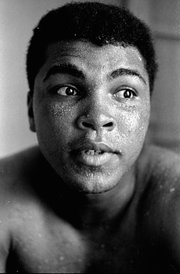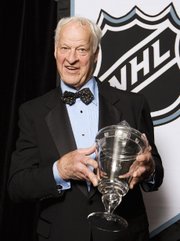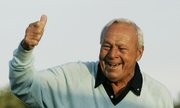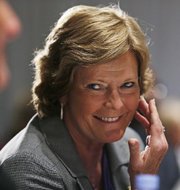Mighty sequoias fell in sports in 2016, transformational figures who reshaped the games and the culture -- from Muhammad Ali to Gordie Howe, from Arnold Palmer to Pat Summitt.
Along the way, other lives lit up sports across the years:
Baseball said goodbye to 24-year-old Miami Marlins pitcher Jose Fernandez, who along with two friends, died when their boat crashed at a high speed into rocks near Miami Beach on a September night after a game. There was Ralph Branca the Brooklyn Dodgers pitcher who spent a lifetime discussing his high-inside fastball that Bobby Thomson hit for "The Shot Heard 'Round the World"; Monte Irvin, the New York Giants Hall of Famer who was part of the first wave of top black players; and Joe Garagiola, the famously mediocre catcher who brought a comic's touch to the broadcast booth.
Basketball lost Jim McMillian, the Columbia forward who helped the Los Angeles Lakers team of Wilt Chamberlain and Jerry West win the 1972 crown; Dwayne "Pearl" Washington, the Syracuse dynamo who sent Big East basketball soaring in the 1980s; and Nate Thurmond, a force at center who could anchor any Warriors team of any era.
Gone in boxing was Aaron Pryor, a relentless fighter who dueled with Alexis Arguello in the 1980s. In football, it was Buddy Ryan, the pugnacious defensive master who coached two NFL teams and was coordinator for the dominant 1985 Chicago Bears; Dennis Byrd, the Jets lineman who went on to walk after being paralyzed in a 1992 game; Dennis Green, who coached Minnesota and Arizona and was the NFL's second black head coach; and LaVell Edwards, the coach whose offenses went airborne in making BYU a power.
Bud Collins and Craig Sager will be remembered for their sports journalism and their fashion choices. Collins, in newspapers and on TV, brought insight, wit and heart to tennis, his passion matched only by his wardrobe's pinks and prints. Sager, a broadcaster bedecked in sports jackets that spilled out of a psychedelic dream, worked NBA sidelines with diligence and humor, and made a gallant stand against leukemia.
Muhammad Ali, 74
On that last ride, the one through his hometown, the windshield of the hearse was covered with so many strewn flowers the driver could barely see the road let alone the throngs lining the streets.
Muhammad Ali was back where it all began, in Louisville, Ky., where he launched a career that would shake up the country and the world like no athlete before or after him.
He was a three-time heavyweight champion, an audacious mix of speed, dazzle and brute force -- a stark counterpoint years later to the shuffling man with a whisper slowed by Parkinson's and countless punches.
His fights with Joe Frazier were an epic trilogy. He shouted and preened. He reminded us he could "float like a butterfly, sting like a bee." He proclaimed himself The Greatest. He did it with wit and guile, boasts and taunts, in prose and rhyme, and always with a wink. He understood the needs of the marketplace and the showmanship that goes with ticket sales.
Ali lost prime years as a fighter, refusing military induction during the Vietnam War. He spoke up when that was not in fashion. He changed his religion and his name.
Time softened the rancor. At the 1996 Atlanta Olympics, he stood, shakily, with torch in hand at the cauldron. Even then, like a butterfly, he could take flight.
"The man who has no imagination," he once said, "has no wings."
Gordie Howe, 88
He was as elemental to the game as ice.
Gordie Howe came out of the hard Saskatchewan prairie and presided over his sport for five decades. No one disputed his singular place in the game. He was Mr. Hockey.
Even Wayne Gretzky acknowledged the preeminence of No. 9 of the Detroit Red Wings, and it was no coincidence Gretzky wore No. 99.
Howe joined the NHL just after World War II, and before he was done finished with 801 goals and 1,850 points -- records Gretzky would go on to break. He led the Red Wings to four Stanley Cups and was MVP six times.
Legions of Canadian kids grew up wanting to be Gordie Howe. He was a player with vision, grit and a shot that would pulverize goalies, although that wasn't the only way he hurt opponents. Sticks and checks and fists were the flip side to his majesty on the ice.
"He was," former Flyers captain Bobby Clarke said, "the ultimate professional hockey player."
Arnold Palmer, 87
His was a life well played.
When golfers today look around at the big prize money on offer, the television coverage all over the world, the sponsorship plums to be plucked and the place golf holds in the sports conversation, they can take a 3-iron from their bag, hold it aloft and thank Arnold Palmer.
"He was The King of our sport and always will be," Jack Nicklaus said.
Palmer never much cared for the regal honorific. His roots were in western Pennsylvania, and with sinewy wrists, a whip of a swing, a swaggering glint in his eye and a cigarette never far from his fingers he carried an entire sport into a new age.
"If it wasn't for Arnold, golf wouldn't be as popular as it is today," Tiger Woods said.
Palmer, with "Arnie's Army" behind him each step of the way, won seven majors and 62 PGA tournaments, and his rivalry with Nicklaus gave golf its juice.
Pat Summitt, 64
When she was 38 and deep into a pregnancy, Pat Summitt insisted on making a recruiting trip to Pennsylvania. After all, she had a job to do.
But the timing was off for the Tennessee basketball coach. Her water broke while she was making her recruiting pitch. A frantic ride to the airport followed, although Summitt was the calmest one around.
The plane was prepared to stop in Virginia. But Summitt, who bleeds Volunteer orange, wouldn't hear of it. Damned if her child would be born anywhere but Tennessee. And so he was.
She coached 38 years at Tennessee. She became the first NCAA coach to reach 1,000 victories. Her showdowns with UConn counterpart Geno Auriemma became the sport's signature rivalry.
Her coaching and her life were cut short by early onset dementia. Her legacy, as President Barack Obama noted, was not in the championships but in her example and her call for young women to "practice hard, play harder and live with courage on and off the court.
Sports on 01/01/2017




